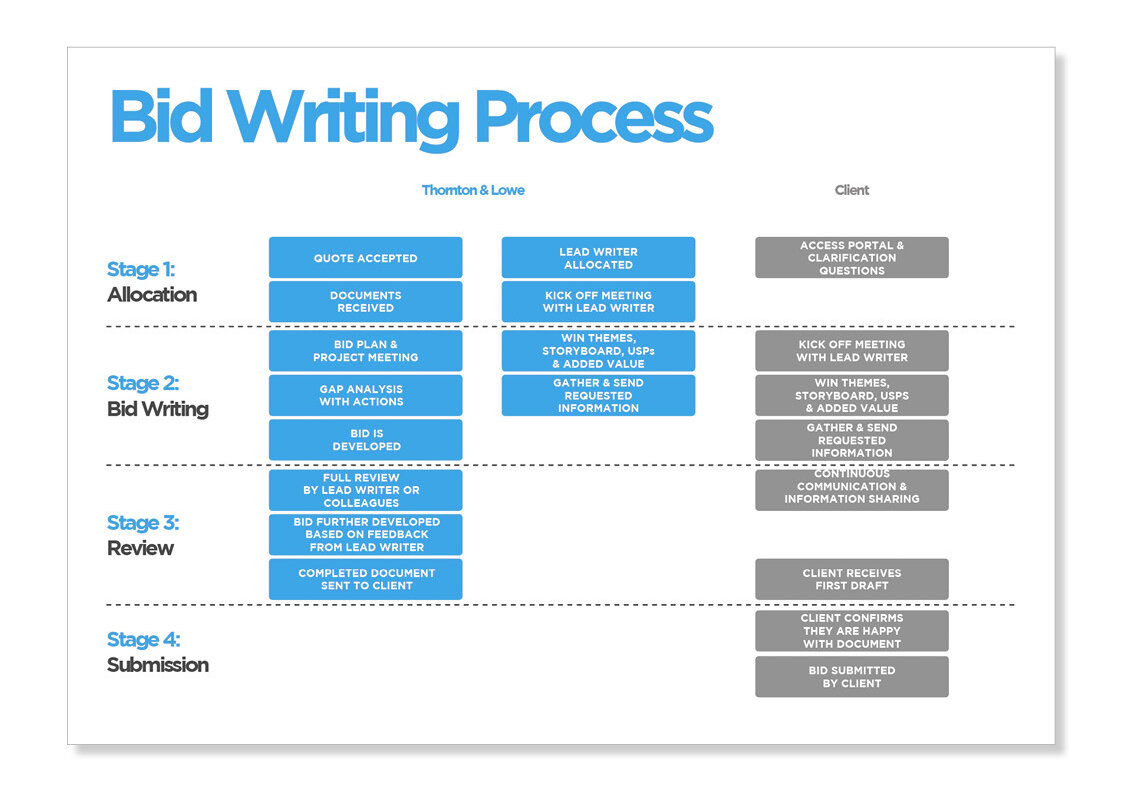The Importance of a Bid No Bid Process
A bid no bid process is essential to your tender process or strategy. Before you start investing time and resources into a bid, step back and consider the requirements and implications of pursuing it. Here are some key questions to ask:
- Can You Deliver to the Requirements? Think about your current and future capacity.
- Do You Have Experience? Is the tender related to your core business or service?
- Is It Winnable? Who is your competition?
- Is It Profitable? Will you make money or incur a loss?
If you answer "no" to any of these questions, it might be wise to reconsider.
Decided to bid but need support?
Let's speakChecklist for a Bid No Bid Decision
Before finalising your decision, ask yourself:
- Can we win this bid?
- Can we offer a competitive solution?
- Is there a lot of competition?
- Do we understand what our competitors are offering?
- Can we match their resources/track record?
- What is our relationship with the client like?
- Do we have the resources and time to submit a bid?
- Do we have the capacity to deliver if successful?
- Do we understand the contract requirements?
- Do we have enough experience?
By answering these questions, you can assess whether it's worth committing resources to a formal bid.

Bid No Bid Examples
A bid no bid process, or bid qualification framework is crucial for making informed decisions about which tenders to pursue. Here are some practical examples to illustrate how this process can guide your choices:
Example 1: Assessing Capacity and Capability
Imagine your company specialises in construction and comes across a tender for a large-scale infrastructure project. Before jumping in, you assess whether you have the current capacity and capability to meet the project requirements. If your resources are already stretched with existing contracts, taking on a new, demanding project might not be feasible. By acknowledging this limitation and choosing not to bid, you avoid overcommitting and compromising your existing projects.
Example 2: Evaluating Experience and Expertise
Suppose your business primarily provides IT services, and you encounter a tender for a cybersecurity contract. While the opportunity is tempting, you need to evaluate whether you have the relevant experience and expertise. If cybersecurity isn't part of your core services and you lack the necessary accreditations, bidding on this contract could be a long shot. Opting not to bid allows you to focus on opportunities that align better with your strengths.
Example 3: Analysing Profitability
Your company finds a tender for a maintenance contract that looks promising. However, after a detailed cost analysis, you realise that the profit margins are slim due to high operational costs and competitive pricing. Despite the allure of securing a new contract, you decide it's not financially viable. By choosing not to bid, you avoid committing to a project that might lead to losses rather than gains.
Example 4: Understanding Competition
Consider a scenario where your business has a good relationship with a potential client, but there's a strong incumbent contractor. You need to evaluate whether you can realistically outbid the incumbent, given their established rapport and proven track record. If the odds are not in your favour, it might be wiser to save your resources for more winnable tenders.
Thornton & Lowe Bid Writing Process - from Quote to Tender Submission
When quoting a tender to provide our bid writing support, we will discuss in detail your ability to bid, pass/fail questions and your experience in the sector. Our input here is a further chance to consider your bid no bid decision.

The Current Landscape Makes Bid Qualification Key
With the UK economy recovering, new opportunities are arising in various industries, including rail, utilities, highways, construction, and manufacturing. Business owners are eager to grow, but it's crucial to take stock of your current standing before bidding on new contracts. At Thornton & Lowe, we've seen firms jump at opportunities without the necessary infrastructure to succeed.
Why Adopt a Bid No Bid Process?
Submitting speculative bids might seem harmless, but it's often costly and time-consuming. A scattergun approach to bid management usually leads to higher costs and lower success rates. Tendering is competitive, so you need to be confident in your chances from the start.

Cost-Effective Bidding by Tailoring your Bid Qualification
Many companies lack in-house expertise for bid writing, making outsourcing a viable option. A successful bid is always more cost-effective, and Thornton & Lowe boasts an impressive 85% success rate. We go the extra mile to secure lucrative contracts for our clients, thriving under the pressure of tight deadlines. It's smarter to approach a specialist bid writing team for a few high-quality bids than to submit numerous bids with little chance of success.




